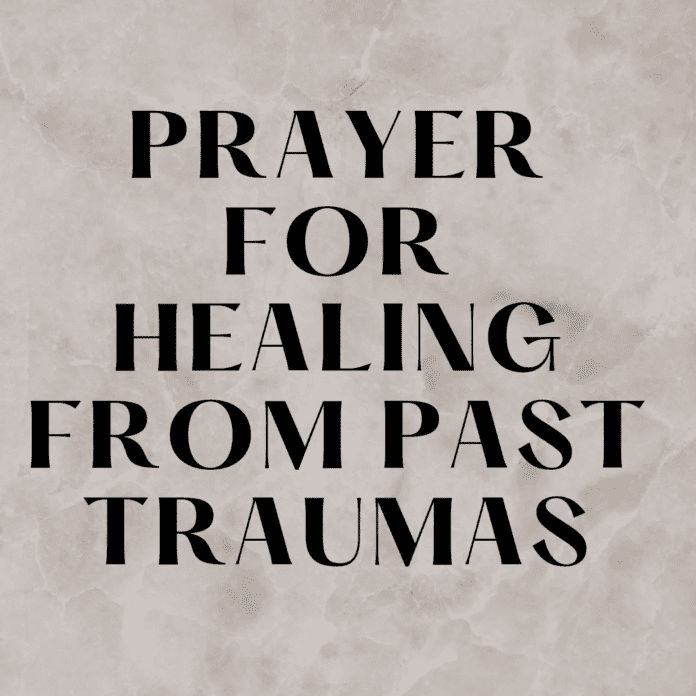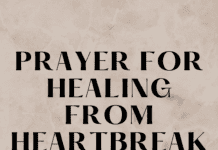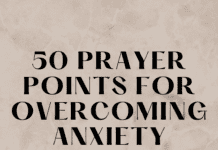Today we will be dealing with Prayer for Healing from Past Traumas. If you have experienced past traumas, you may be struggling with the emotional and psychological aftermath. Healing from past traumas can be a difficult and complex process, but prayer can be a powerful tool to aid in your recovery. Many people find comfort and solace in prayer, and it can provide a sense of peace and hope in the face of difficult circumstances.

Prayer for healing from past traumas can take many forms, depending on your personal beliefs and spiritual practices. Some people may find comfort in reciting traditional prayers or reading scripture, while others may prefer to create their own prayers or meditations. Regardless of the specific form your prayers take, the act of prayer can help you to connect with a higher power and tap into a sense of inner strength and resilience.
Understanding Trauma

Trauma can be defined as a deeply distressing or disturbing experience that overwhelms an individual’s ability to cope. Trauma can be caused by a single event, such as a car accident, or by ongoing experiences, such as abuse. Trauma can have a lasting impact on an individual’s mental and physical health, as well as their ability to function in daily life.
Types of Trauma
There are several types of trauma, including:
- Acute trauma: This type of trauma is caused by a single event, such as a natural disaster or violent attack.
- Chronic trauma: This type of trauma is caused by ongoing experiences, such as abuse or neglect.
- Complex trauma: This type of trauma is caused by multiple, ongoing experiences, such as childhood abuse or neglect.
Effects of Trauma on the Mind and Body
Trauma can have a wide range of effects on an individual’s mind and body, including:
- Physical symptoms: These can include headaches, fatigue, muscle tension, and sleep disturbances.
- Emotional symptoms: These can include anxiety, depression, irritability, and mood swings.
- Cognitive symptoms: These can include difficulty concentrating, memory problems, and confusion.
- Behavioral symptoms: These can include avoidance of certain situations or places, self-destructive behavior, and substance abuse.
It is important to note that the effects of trauma can vary from person to person and can be influenced by factors such as the type and severity of the trauma, the individual’s coping skills, and their support system.
Principles of Healing

Healing from past traumas can be a difficult and complex process that requires patience, self-compassion, and a willingness to confront difficult emotions. While everyone’s journey will be unique, there are some general principles that can be helpful in guiding your healing process.
Acceptance and Acknowledgment
The first step towards healing is accepting that you have experienced trauma and acknowledging the impact it has had on your life. This can be a difficult process, as it requires you to confront painful emotions and memories. However, it is an essential step in moving forward.
One way to practice acceptance and acknowledgment is to create a safe space for yourself where you can explore your emotions without judgment. This might involve journaling, talking to a trusted friend or therapist, or engaging in a mindfulness practice.
Self-Compassion and Forgiveness
Self-compassion and forgiveness are essential components of the healing process. It is important to remember that you are not to blame for the trauma you have experienced, and that it is okay to feel the emotions that come with it.
One way to practice self-compassion is to treat yourself with the same kindness and understanding that you would offer to a close friend. This might involve giving yourself permission to take a break when you’re feeling overwhelmed, or reminding yourself that it’s okay to make mistakes.
Forgiveness is also an important part of the healing process. This doesn’t mean that you have to forgive those who have hurt you, but rather that you can release the anger and resentment that you may be holding onto. Forgiveness can be a difficult process, but it can also be incredibly freeing.
By practicing acceptance, self-compassion, and forgiveness, you can begin to move towards healing from past traumas. Remember that healing is a journey, and that it is okay to take things one step at a time.
Healing Practices

Mindfulness and Meditation
Mindfulness and meditation are effective ways to help you cope with past traumas. These practices can help you gain a sense of calm and clarity, allowing you to process your emotions and thoughts more effectively. Mindfulness involves paying attention to the present moment without judgment, while meditation focuses on quieting the mind to achieve a deep state of relaxation.
One way to practice mindfulness is to focus on your breath. Take deep breaths in through your nose and out through your mouth, paying attention to the sensation of the air moving in and out of your body. You can also try body scan meditation, which involves focusing on each part of your body, starting from your toes and working your way up to the top of your head.
Therapeutic Approaches
Therapeutic approaches can also be helpful in healing from past traumas. One such approach is cognitive-behavioral therapy (CBT), which focuses on changing negative thought patterns and behaviors. Another approach is eye movement desensitization and reprocessing (EMDR), which involves using rapid eye movements to help process traumatic memories.
In addition to these approaches, there are many other types of therapy that may be helpful, such as art therapy, music therapy, and somatic therapy. It’s important to find a therapist who specializes in trauma and who you feel comfortable working with.
Overall, there are many different healing practices that can help you cope with past traumas. By exploring different approaches and finding what works best for you, you can begin to move forward and find a sense of peace and healing.
Nurturing Resilience

Building Support Systems
One of the most important things you can do to nurture resilience and promote healing from past traumas is to build a strong support system. This can include friends, family members, mental health professionals, and support groups. It’s important to have people in your life who you can turn to when you need help or support.
Consider reaching out to a therapist or counselor who specializes in trauma. They can provide you with tools and techniques to help you cope with difficult emotions and memories. You may also find it helpful to join a support group for survivors of trauma. These groups can provide a safe and supportive space where you can connect with others who have had similar experiences.
Cultivating Positive Habits
In addition to building a support system, cultivating positive habits can also help you nurture resilience and promote healing. Some habits to consider include:
- Practicing self-care: Make time for activities that bring you joy and help you relax, such as yoga, meditation, or spending time in nature.
- Getting regular exercise: Exercise can help reduce stress and anxiety and improve your overall mood.
- Eating a healthy diet: Eating a balanced diet can help support your physical and mental health.
- Practicing mindfulness: Mindfulness techniques, such as deep breathing and visualization, can help you stay present in the moment and manage difficult emotions.
By building a support system and cultivating positive habits, you can nurture resilience and promote healing from past traumas. Remember to be patient with yourself and take things one day at a time. With time and effort, you can find healing and move forward in a positive direction.
Prayer For Healing From Past Traumas
1. Heavenly Father, I come before You seeking healing from the deep wounds of past traumas.
2. Lord, I surrender all my pain and hurt to You, asking for Your divine touch to bring healing and restoration.
3. I pray for the courage to face and process the memories and emotions associated with my past traumas.
4. Help me, Lord, to release any bitterness, anger, or resentment that I may be holding onto because of my past experiences.
5. Grant me the strength to forgive those who have hurt me and to let go of any grudges or feelings of revenge.
6. Fill me with Your peace, Lord, and replace my anxiety and fear with trust in Your loving care.
7. I pray for healing in my mind, body, and spirit, knowing that You are the ultimate healer.
8. Help me to see myself through Your eyes, as a beloved child deserving of love, respect, and dignity.
9. I renounce any lies or negative beliefs that I have internalized because of my past traumas and ask for Your truth to reign in my life.
10. Surround me with supportive and understanding people who can walk alongside me on this journey of healing.
11. Lord, I lift up to You all the broken areas of my heart and ask for Your gentle touch to mend and restore them.
12. Give me wisdom and discernment as I seek professional help and therapy to address my past traumas.
13. Help me to set healthy boundaries in relationships and to prioritize my emotional well-being.
14. I pray for healing in my family relationships that may have been affected by my past traumas.
15. Grant me the grace to let go of guilt and shame and to embrace my worth and value as Your precious creation.
16. Lord, I ask for healing in my dreams and thoughts, that they may be filled with Your peace and goodness.
17. Protect me from triggers and flashbacks that may cause me distress, and guide me in developing healthy coping mechanisms.
18. I pray for restoration of my self-esteem and confidence, knowing that I am fearfully and wonderfully made by You.
19. Help me to find joy and purpose in life despite the pain of my past traumas.
20. I surrender my need for control and perfectionism to You, trusting that Your grace is sufficient for me.
21. Lord, I pray for healing in my physical body from any ailments or conditions exacerbated by my past traumas.
22. Give me the strength to face any legal or financial challenges resulting from my past traumas, and guide me in seeking resolution and justice.
23. I pray for healing in my spiritual life, that I may experience Your presence and peace in profound ways.
24. Help me to learn from my past experiences and to use them for Your glory and the benefit of others.
25. I declare Your promises of restoration and wholeness over my life, knowing that You are faithful to fulfill them.
26. Surround me with Your love and protection, shielding me from any further harm or trauma.
27. I pray for healing in my inner child, that the wounded parts of my heart may be comforted and healed by Your unconditional love.
28. Guide me in developing healthy coping strategies and self-care practices that nurture my well-being.
29. Grant me the courage to share my story with others, knowing that vulnerability and authenticity are pathways to healing.
30. Thank You, Lord, for Your faithfulness and compassion. May Your healing power continue to work in me, bringing complete restoration and freedom from past traumas. Amen.














